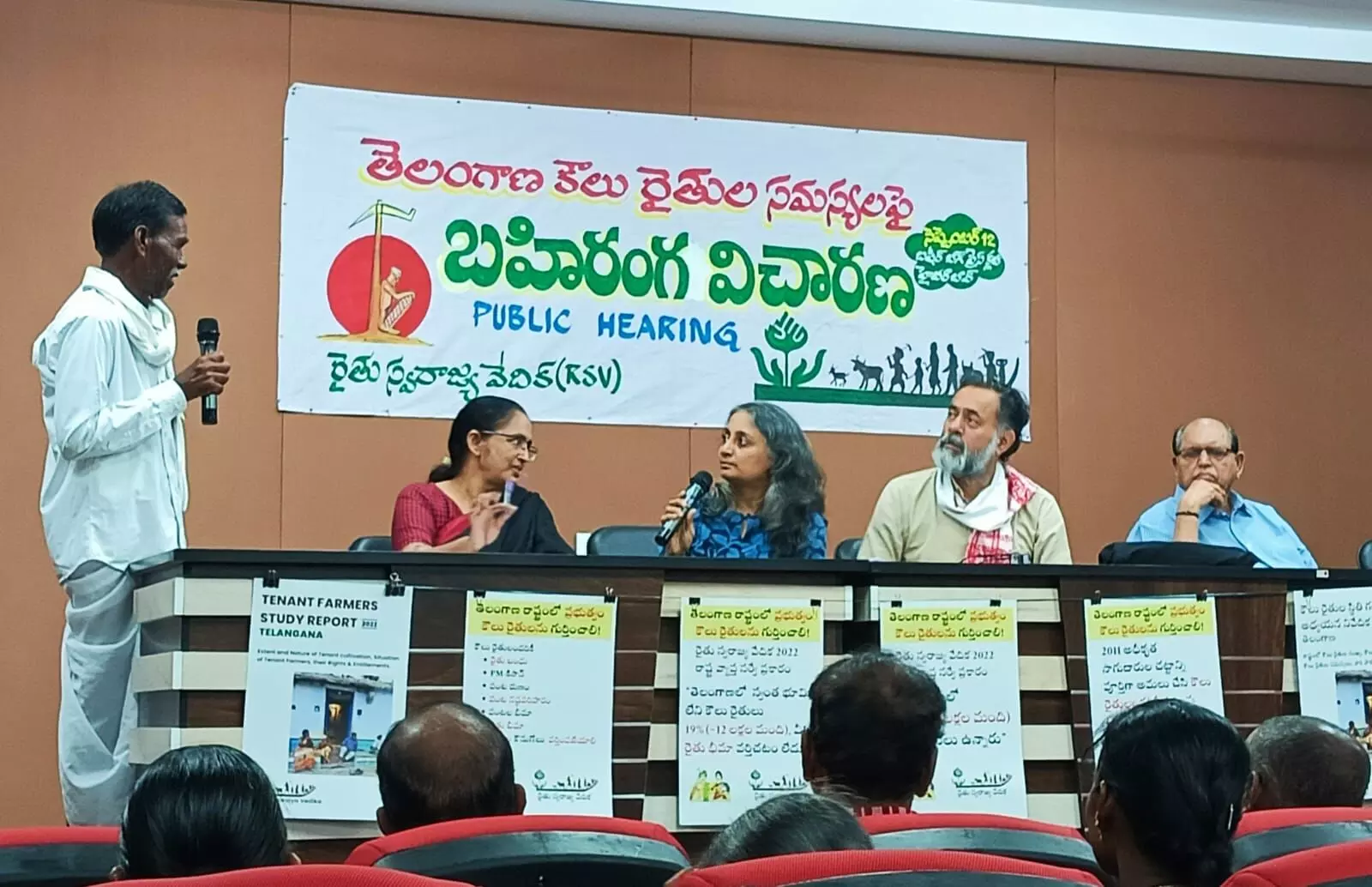People’s Jury holds first public hearing of Telangana tenant farmers; demands LCA implementation
People’s Jury called for registering all tenant farmers and extending crop loans, insurance, disaster compensation, and the state government’s Rythu Bandhu schemes to them
By Sulogna Mehta
Hyderabad: Alaramed by the discriminatory policies, People’s Jury has sent an SOS to the Telangana government to implement the 2011 Licensed Cultivators Act *(LCA) and extend all government benefits to tenant farmers in the state
Rythu Swarajya Vedika (RSV) organized the first state-level public hearing of tenant farmers of Telangana in front of a People’s Jury at Hyderabad on Tuesday.
The jury consisted of eminent citizens. About 120 tenant farmers from 13 districts participated in the public hearing. Tenant farmers highlighted the various problems faced by them.
People’s Jury called for registering all tenant farmers and extending crop loans, insurance, disaster compensation, and the state government’s Rythu Bandhu schemes to them.
Suicides, no benefits from government schemes plague tenant farmers
Tenant farmers stated that since the government does not recognize them as farmers, they do not get the benefit of the Rythu Bandhu scheme or Rythu Beema, or even bank loans, disaster relief, and the opportunity to sell their crops to government procurement agencies. As they are not recognized, they are not entitled to crop loan waivers. Farmers said they have fallen into a debt trap.
Though in March 2023, the Telangana chief minister had declared that disaster relief for crop damage would be given to tenant farmers, in reality, very few of them got it. It is because the government did not implement the 2011 Licensed Cultivators Act (LCA), which would have given identification cards (LEC) to all tenant farmers.
Tenant farmer suicides were also highlighted by three women farmers who spoke at the public hearing about their husbands’ suicide due to debt and despair. As per RSV, 75% of farmer suicides in Telangana are by tenant farmers.
Study on tenant farmers
On behalf of Rythu Swarajya Vedika (RSV), B Kondal described how RSV has held district-level public hearings and meetings of tenant farmers over the past two months, culminating in the first-ever state-level Public hearing on this issue. Kirankumar Vissa shared the findings of the landmark study of tenant farmers. In 2022, RSV conducted a door-to-door survey of 7,744 farmers in 34 villages from 20 districts. The survey showed that 36% of the farmers were tenant farmers cultivating leased land. The tenant farmers are predominantly from the SC, BC, and ST communities and did not receive any benefit from government schemes because of the non-implementation of the 2011 Licensed Cultivators Act.
A success story
A unique story of collective action of tenant farmers was shared by Nakirekanti Saidulu (Yogi), an SC tenant farmer from Narayanagudem village of Suryapet district. When the tenant farmers of the village found that the lease rate of 12 bags of paddy was too high, they formed a committee of about 100 tenant farmers of their village in 2022 and decided not to pay more than nine bags of paddy as the lease cost. Due to their collective stand, the owners had to agree to the lower lease rate, and it is continuing to date.
Members of the People’s Jury
People’s Jury of eminent citizens included Professor Yogendra Yadav, national farmers’ movement leader and president of Swaraj India, T Gopal Rao (retired IAS), former Revenue Secretary of Andhra Pradesh, Kavitha Kuruganti, farmers’ rights activist, national convener of Alliance for Sustainable and Holistic Agriculture (ASHA) and K Sajaya, Sahitya Akademi award-winning writer and social activist, Telangana Women and Transgender Organizations JAC.
Jury indicts the state government of neglect
After the tenant farmers deposed before the Jury, the members gave their verdict indicting the state government of sheer neglect of tenant farmers and failure to implement the Land Licensed Cultivators Act (2011), which mandates the government to issue Loan Eligibility Card (LEC) to every tenant farmer after verification.
The Jury members said that while the Telangana government boasts of being a farmer-friendly government, the tenant farmers who form 36% of farmers are neither getting the benefit of the Rythu Bandhu cash support scheme of Rs 10,000 per acre, nor the benefit of repeated loan waiver schemes. They are also not getting any disaster relief and crop insurance. Even their families are not getting the benefit of Rythu Beema's life insurance scheme after death.
“Tenant farmers at the public hearing have exposed the four big lies that the Telangana government has been telling about tenant farmers. It is a shame that the government is not implementing the 2011 Licensed Cultivators Act,” said Yogendra Yadav.
“It is a big scam. Thousands of crores of public money are being transferred to non-cultivating landowners through Rythu Bandhu, while tenant farmers who are cultivating get nothing. The government should recognize the tenant farmers as primary stakeholders,” said Kavitha Kuruganti.
“The ruling party and all parties should recognize that 22 lakh tenant farmer families each have three to four votes. At least as part of their election agenda, they should heed the demands of the tenant farmers.”
The jury urged the government to immediately start implementing the 2011 Licensed Cultivators Act, and subsequently bring even more improvements in the Act to enable more tenant farmers to receive recognition.
RSV calls for collective action
Rythu Swarajya Vedika called on the tenant farmers of Telangana to come together on a common platform, taking inspiration from the farmers of Narayanagudem village and through collective action, achieve better livelihood and their rights and recognition from the government.
RSV demanded that all political parties should promise the recognition and inclusion of all tenant farmers in government support systems and proper implementation of the 2011 Act.